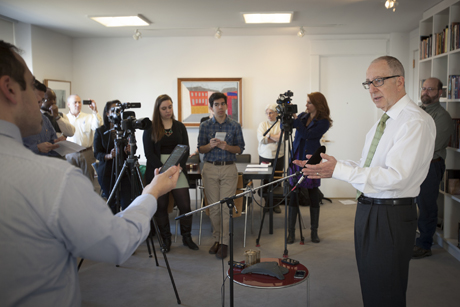Skorton sets priorities for next 15 months as president
By Joe Wilensky

Back on campus after a day in Washington, D.C., where it was announced that he would become the next secretary of the Smithsonian Institution in July 2015, Cornell President David Skorton was discussing his priorities as university president for the next 15 months with members of the local and regional media in his office.
“I want to do everything I can do to help maintain the excellence that draws students here,” Skorton said, noting continued extraordinary demand: There were 43,000 applicants for the approximately 3,200 slots in the incoming fall 2014 class, he said.
But such issues as the continuing impact of staff reductions stemming from the 2008-09 recession and increased workloads need continued work and attention, he said: “We’re still finding our equilibrium” and footing across the campus.
Campus safety issues, like the prevention of sexual assault, and issues of diversity and inclusiveness also remain top priorities, because “there continue to be people on campus who don’t feel safe and welcome,” he said.
Skorton said he has appreciated the straightforward conversations he has had with Ithaca Mayor Svante Myrick ’09; Herb Engman, supervisor of the town of Ithaca; and others regarding the level of financial support the university provides to the city and surrounding municipalities. “Because we are all of this community – every one of us,” he said. “It’s an issue that’s never going to be totally resolved, but it’s an issue that we continue to need to roll our sleeves up and work on.”
Skorton noted the generosity of many alumni and friends supporting programs in Ithaca and at Weill Cornell Medical College and Cornell Tech in New York City, saying he is optimistic that not only will the university complete the “Cornell Now” campaign but go “far beyond the expanded [$4.75 billion] goal that we set.”
He also needs, he said, to continue to work on Cornell’s commitment to public engagement, utilizing and harnessing the creativity and knowledge on Cornell’s campuses to benefit those in the larger community, the nation and the world at large. He recalled President Emeritus Frank H.T. Rhodes’ apt reference to Cornell as “the land-grant university to the world.”
“It sounds like a motto, [but] it’s actually a description of what Cornell does,” Skorton said.
His toughest challenge since he took over as president more than seven years ago, he said, has been to ensure “that the doors of this campus are open to people based on ability and aspiration, and not on financial means.” Broadly and nationwide, it’s the biggest challenge for higher education now, he said.
One of the most important things Cornell has accomplished “is to somewhat lower those barriers based on means,” Skorton said. “We have not brought them all the way down … but we are farther along the path than we were some years ago.” He said he would be proud if the one thing he leaves as a legacy is to mark “access and affordability for education as one of our top measures of success.”
Skorton said that when a search consultant had first contacted him about the Smithsonian position, he recognized a “once-in-a-lifetime opportunity” to work in the public interest for an institution with an unbelievably broad area of activity, covering “the breadth, from the highest tech to culture and art.” Like Cornell, Smithsonian does research and offers education (for self-enrichment), and both are committed to extensive public engagement, he said. Both institutions also are members of the edX consortium for massive open online courses (MOOCs) and prioritize open, broad access to knowledge.
Skorton said he knows he and his wife, Professor Robin Davisson, will miss the visual and natural beauty of the Ithaca area (his first visit to Cornell was as a University of Iowa representative at Cornell President Hunter R. Rawlings’ inauguration in 1995) and the spirit of the people in Cornell’s communities, who aren’t afraid to challenge him and each other.
“And, with all respect to the faculty and staff, I’m going to miss the students, interacting with them,” he said.
Robert Harrison ’76, chairman of the Cornell University Board of Trustees, will soon appoint a search committee, to be headed by Jan Rock Zubrow ’77, that will lead the effort to select the university’s next president.
What would Skorton’s advice be to his successor?
“Cast the net broadly for day-to-day advice, because of the broad nature of excellence on this campus,” he said. “But if any one thing had to be foremost, think about the needs of the people who want to come here – who come from all over the world, not just the United States – think about serving those people, those students, and making it possible for them to imagine a Cornell education and then actually realize that dream.”
Media Contact
Get Cornell news delivered right to your inbox.
Subscribe